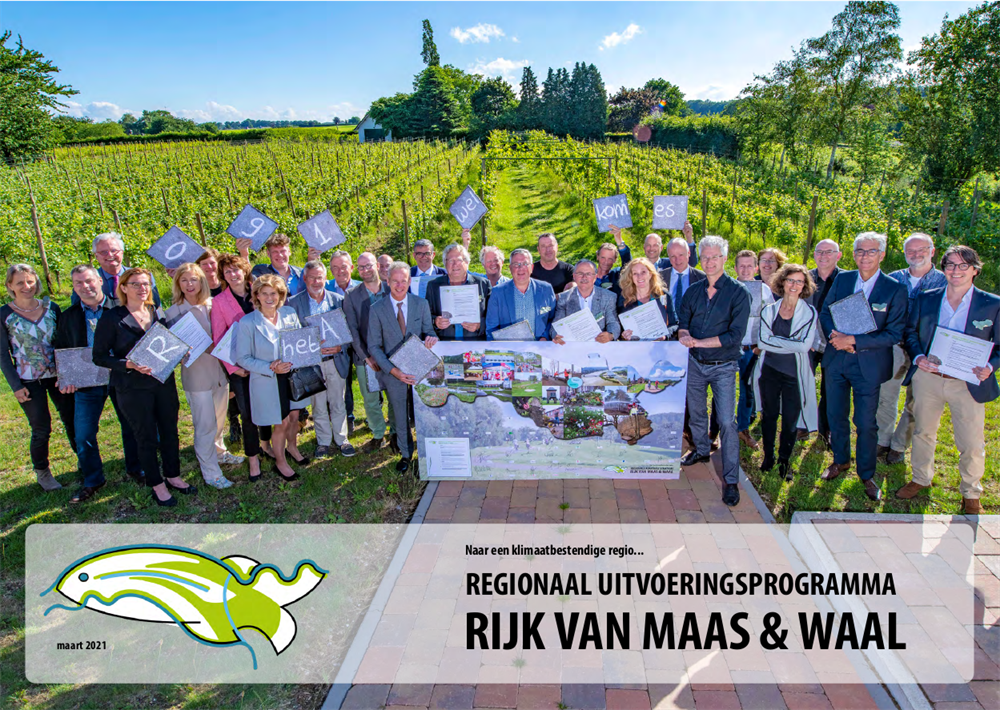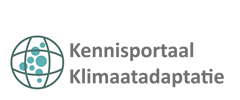Regional Implementation Programme for Rijk van Maas & Waal region
The Rijk van Maas & Waal has drawn up a Regional Implementation Programme, in which the municipalities of Berg & Dal, Beuningen, Druten, Heumen, Nijmegen, West Maas & Waal, and Wijchen; the Rivierenland district water board; and the province of Gelderland are presenting their plans for climate-proofing the region. The goals must definitely be achieved by 2050, but preferably even before 2035.

From strategy to implementation
Since 2019, the region has been pursuing a Regional Adaptation Strategy. This sets out how the regional and local governments involved intend to adapt their administrative areas to the changing climate. In the Regional Implementation Programme, the region specifies the measures that have been scheduled for the next four years, how the measures will be implemented, and which parties will be involved in the process. The Regional Implementation Programme is outlined below.
The nine spearheads
The Regional Implementation Programme is focused on nine spearheads from the Regional Adaptation Strategy. These spearheads will be addressed first in order to achieve results in the very near future. The nine spearheads involve a range of projects and processes:
- Replacing pavement with greenery: the region is depaving public space and encouraging others to follow suit;
- Climate-proofing roads: with effect from 2021, municipal, regional, and provincial authorities will be taking optimum account of climate resilience in road maintenance and road reconstruction projects. Furthermore, the region is organising relevant meetings with stakeholders;
- Agenda for rural areas: an agenda will be drawn up for rural areas, comprising short-term and medium-term measures covering the period from 2024 to 2035. The goal is to involve all the stakeholders in this process;
- Restoration of lateral moraine blue energy: the Rijk van Nijmegen region intends to collect a maximum of water in the lateral moraine located in its area, in collaboration with a range of parties. This will reduce waterlogging from the lateral moraine in surrounding villages and prevent drought;
- Heat plans: in collaboration with the community health service of Gelderland-South, nearly all the municipalities have drawn up local heat plans to protect vulnerable groups of residents during heatwaves. The municipalities are developing distance-to-cool-spot maps on the basis of heat stress maps. This will identify the locations most affected by heat stress during a heatwave;
- Climate agreements in the construction sector: effective immediately, new houses will be as climate-proof as possible. A healthy living environment and nature are vital in this respect. In the Arnhem-Nijmegen housing deal, climate adaptation is already one of the conditions. In addition, a building block will be added similar to the Climate-adaptive Construction Covenant in place in the province of Zuid-Holland. This is a document comprising construction agreements for all the local and regional governments.
- Climate knowledge up to par: the region aims to share knowledge, experience, and successes in the field of climate adaptation. In 2016, a stress test was conducted and the Climate Impact Atlas of the Rivierenland district water board features up-to-date regional data. This Atlas unlocks the available knowledge to a wide target group. Furthermore, the region is exploring solutions to water quality issues caused by climate change;
- Communication strategy and campaign: the region intends to deploy several means of communication to raise awareness of climate change among governments, businesses, educational establishments, and residents. In addition, it plans to show these parties how to capitalise on opportunities and what individual measures they can take to counteract the negative effects of climate change;
- Climate resilience in the performance agreements: in terms of climate resilience, the region is raising the bar annually in the performance agreements with housing corporations. The goal is for all the corporations to include climate adaptation in their performance agreements in the ultimate pursuit of climate-proof corporation houses and gardens.
Monitoring
The region will have process leaders monitor each spearhead in order to get a picture of what is going well and where improvement is in order. The process leaders will monitor the progress by meeting with stakeholders and governments once a year. In its communication strategy, the region will set down how it intends to share the outcomes of this monitoring process.
Lessons to be learned
Developing a regional adaptation strategy into a regional implementation programme poses quite a challenge. The region has learned the following lessons from this process:
- To proceed from ambition and strategy to an implementation programme, it is vitally important for local and regional governments to meet sufficiently frequently, both officially and informally. This has enabled the parties involved to get to know one another, which has helped to reach mutual agreement. The Regional Adaptation Strategy symposium, attended by all the administrators and stakeholders, has made a significant contribution in this respect. Furthermore, it is important to demonstrate the value of a regional approach: if you want to go fast, go alone; if you want to go far, go together.
- At the time the Regional Adaptation Strategy was drawn up, the regional and local level approaches were fairly similar in set-up. However, when the Regional Implementation Programme was drawn up, sharp differences had arisen. As was only logical, since the implementation programme also dealt with costs. Smaller municipalities have smaller budgets, which resulted in difficult choices: regarding projects, spearheads, and ambitions. Multiple meetings at both the executive and administrative levels, produced consensus on the Regional Implementation Programme, on who would be participating in which spearhead projects, and on how the Incentive Funds would be spent.
Contact persons
Arthur Hofstad, Marjolein Reijnierse (waterschap Rivierenland)
Hofstad Advies & Organisatie
arthur@hofstadadvies.nl of m.reijnierse@wsrl.nl
06 57948876 (Arthur) of 0344649219 (Marjolein)
